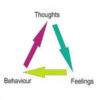Today’s topic is going to be a bit weird, but hopefully enlightening as well. I have some strange questions to start with.
Can you decide to not feel pain? Can you decide that anger makes you happy? Or that fear makes you calm?
You can decide your reaction to these things, but I think the initial effect is their regardless.
Does your body need you to direct it in order to have a response to your stimuli? Any form of stimulation.
I think maybe you can train yourself to have a different reaction, but it would take a lot of work. Like martial arts can train you to react without fear.
A person who is able to practice detachment may be able to experience pain differently.
I offer today that you cannot control your behaviour directly. That you do not decide on what course of action you will embark.
Yes, for the most part you can’t control what emotions you are feeling.
It’s been said that once a decision is made the rest is mere consequence, and because you can’t control what emotion you are feeling, your thoughts will automatically be constrained by your perceived state of being. Does thinking happy thoughts when you are royally ticked off really work?
Not for me. Not for anyone. This is why the idea that there is no free will has grown popular in some circles, our brains construct our experiences in stages, phases of recognition.
I think you can’t control your feelings, but you can control your actions. You can’t control your actions directly. This is why people struggle so much with self control, keeping New Years resolutions and things like that. This is why, when you are really enraged, your body will shake and your posture shift in such a way that you will appear to want to either do violence or cower and flee, even if you seem to make yourself do neither of those. Does this sound wrong from your experience?
Our visual perception primarily distinguishes contrast. Colour only emerges later in the process of perception, and well, everything that happens to us is first recognized as a degree of deviation from our rest state, our homeostatic state.
We instinctively recognize a change before we are aware that we heard something or saw something, and that recognition gets more and more complex as it “emerges” into our consciousness. There is even evidence that suggests a great part of the nervous system at the core of our brains has no single correlation to any specific form of stimuli, no anchor to any specific type of memory, and instead, they seem to respond to concepts, abstractions, like hard or soft, high or low, black or white. And then our higher order memory just matches more refined details onto the perception when it reaches a sufficient degree of recognizable.
An example: I can recognize my wife when I see her, but my very first instinct is not to recognize specifically her, but rather a presence, then a person, then a female, then her.
I’m reminded of the Halloween game, where you go into a ‘haunted house’ and someone hands you a peeled grape in the dark and you get freaked out when they tell you it’s an eyeball. Is that related? That is related, and in fact, at the basic level you have no way of telling that they are wrong, especially if it’s your first experience of such a prank. The brain reuses the basic web in which it forms perceptions, and only your “higher functions” have any of the specific details that make up what you think of as conscious experience. For example, my wife has brown eyes and silvery hair, but other women have blue eyes and blond hair, or red hair and green eyes, but my brain will still register; person, then woman, then my wife, or not my wife as the case may be.
They have even had the chance to observe when this process has been compromised. In the instance I am thinking of, the man knew he was married, and knew the sound of his wife’s voice when he heard it, but couldn’t recognize her when he saw her. He would look for the source of her voice, no matter where she might be standing.
Face blindness. Yes. He could see and recognize everything else.
So, though you cannot control your behaviour, you can control your perception, both consciously and instinctively. This has born up even under rigorous experimental testing as accurate as you would find in chemistry and physics. Your personality is not actually present in your behaviour.
Yes, behaviour follows perception. I don’t drop the peeled grape until I perceive it as eye.
Your thoughts are welcome. Be well friends.
Travis Saunders
Dragon Intuitive
~science,mysticism,spirituality~



Leave a Reply